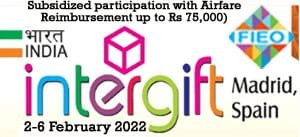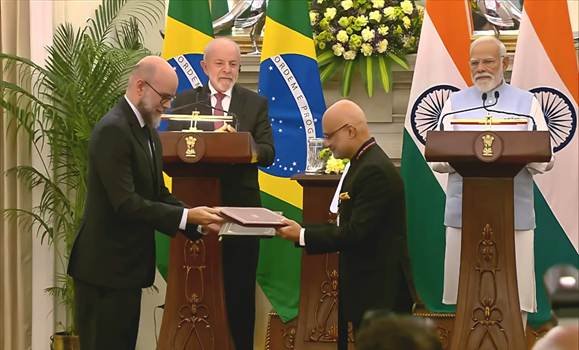Indian exporters expect to pay over US$75 billion or more as freight charges this year, says Dr Sakthivel
Indian exports are on the upswing and are within the range of reaching the milestone of US$400 billion, but exporters are concern about logistics challenges which should be addressed in the Union Budget to be presented on 1 Feb 2022 in parliament.
“The order booking position of exporters across sectors is extremely encouraging, assuring us of continuing on the growth trajectory next fiscal as well,” said FIEO President Dr A Sakthivel.
“However, the logistics and few challenges are of grave concern to them. Shortage of containers, abnormal increase in freight and space constraints on ships are impacting our exports. Therefore, the budget should draw a road map for addressing these issues,” he said in a call on the Finance Minister Nirmala Sitharaman who would be presenting the budget for 2022-23.
Dr Sakthivel highlighted issues.
- Logistics Issues:
(a) Looking into our mid-term target of US$1 trillion by 2027-28 for merchandise exports, container manufacturing should be encouraged more so as we are also pushing coastal shipping in our country. A Production Linked Incentive (PLI) kind of scheme for container manufacturing can come handy to encourage domestic manufacturing of containers addressing some cost disadvantages.
(b) Since international trade is emerging as an important component of the Indian economy, we should develop an Indian shipping line of global repute. We may be remitting over US$75 billion or more as freight charges this year. An Indian shipping line, which gets 25% of this business can save US$17-$20 billion on recurring basis annually. This figure will increase as we move towards a trillion-dollar merchandise exports. Some tax concessions may be required so that such ships are encouraged to register in India.
- Marketing issues:
Our MSMEs lack exposure despite having the best of products. Many countries encourage overseas marketing though fiscal or tax incentives. We should consider providing a double tax deduction for overseas marketing so that for example for every US$1,000 spent on global marketing, US$2,000 may be provided as tax deductions under the income tax for specified kinds of overseas marketing for market exploration, market penetration and market promotion etc. A ceiling of US$500,000 may be put under the Scheme so that the investment and tax deduction are limited.
- Credit issues:
(a) The Emergency Credit Linked Guarantee Scheme (ECLGS) has provided huge support to businesses particularly to MSMEs during the Covid-19. The scheme should be extended for one more year for seamless flow of credit to business particularly as the demand of credit has gone up with increase in prices of inputs, transportation cost including overseas freight and logistics disruptions. On the contrary, the value of collateral has deteriorated during the Covid-19 and thus ECLGS will provide the necessary oxygen to the industry.
(b) Interest Equalisation Scheme (IES): The IES has helped exporters to get the credit close to the international benchmark. The scheme requires extension with effect from 1 October 2021 at least for 3 years so that exporters can take long-term positions based on the competitive interest rates under the IES.
- R&D Support:
R&D and product development is key to sustained exports. Looking into the low R&D spending as a percentage of GDP in India, we need to encourage such spending through liberal tax support as R&D is having a high gestation period with a lot of uncertainties. 200-300% tax deductions may be provided on investment in R&D and product development for a long-term exports strategy to increase value addition and diversify the exports base as well.
- Agri Exports Support:
Our agri exports have done exceedingly well both in 2020-21 and in 2021-22 but the share of the processed sector is still low in our agri exports. We need to provide a higher budget for agri exports more so for the Transport and Marketing Assistance (TMA) Scheme and backward and forward linkages in the agri sector.
- Services:
Services rendered to foreign nationals and paid in Free Foreign Currency to be given IGST/ITC Refund:
Services Exports are growing with good performance from IT and IT-enabled services which accounts for two-third of India’s services exports. Services sector is not getting any support as SEIS benefits are also no longer available. The travel & tourism sector has been hit heavily due to pandemic and needs to be given encouragement.
Mode-2 of services (service provided to a Foreign national in India paid in free foreign currency) have neither been provided exemption from IGST nor refund of accumulated input tax credit. While we appreciate the new provision incorporated under Section 15 of IGST Act providing the refund of IGST on supply of goods to tourists leaving India at the International airports, it is equally necessary that no taxes are imposed on the services being provided to them during their stay in India.
The travel tourism sector including hotel and hospitality is already burdened with high taxation and tourists are preferring South East Asian countries. Tourism has one of the highest capital employment ratios and therefore, refund of IGST/ITC facility to Mode-2 of services will go a long way in providing competitiveness to the sector and helping the country to take its tourism earning to US$100 billion in next 5 years.
- Restoration of facility for Import of Trimming and Embellishments under Customs Notification No.2/2021 dated 1st of February, 2021:
The MSME exporters source most of their raw material from the domestic market and import only small lots of trimmings and embellishments under the EPC Scheme. Most of the exporters import these items because of the buyers’ nomination. Hence need to be sourced from defined sources and within sharp timelines. This facility provided required flexibility to the smaller exporters to import such items just in time to meet the delivery schedule.
The total duty foregone under the scheme in 2020-21 has been less than Rs.300 crore as the duty foregone value against the utilized entitlements from various EPCs. Such entitlement certificates should only be issued for import purposes and in case, any domestic unit including SEZ is able to meet such requirement of exporters, the entitlement certificates may be surrendered to the concerned EPC and invalidation letter in lieu of the same may be issued so that the apprehension that the certificates may be utilized both for imports and procurement from domestic sources can be addressed. fiinews.com










